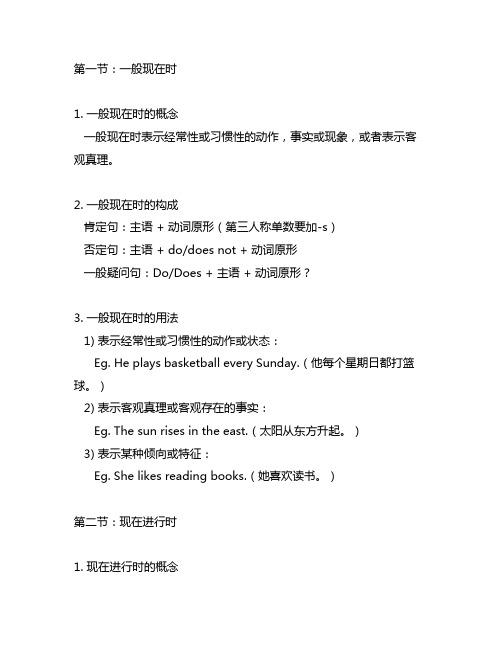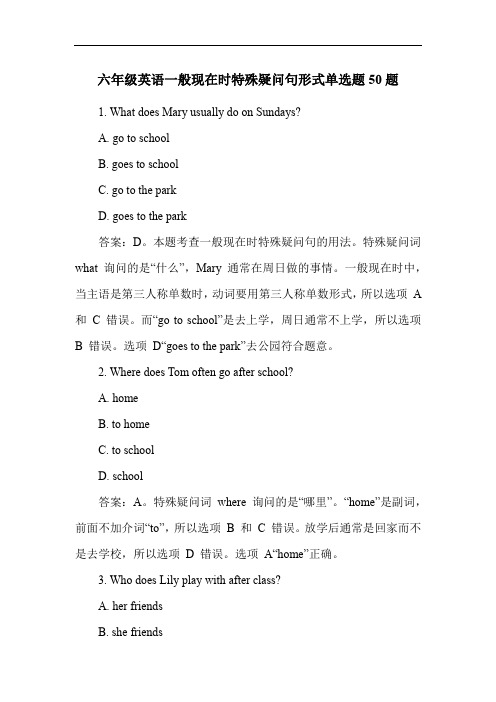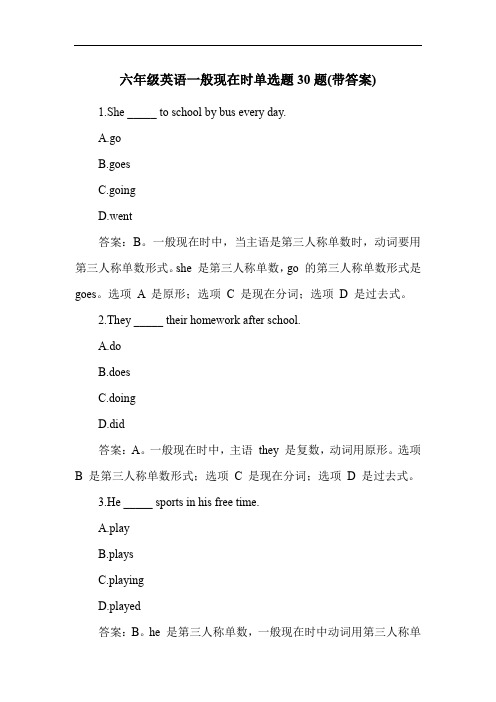六年级英语一般现在时
六年级上册英语第二单元卡通time语法课堂笔记译林

第一节:一般现在时1. 一般现在时的概念一般现在时表示经常性或习惯性的动作,事实或现象,或者表示客观真理。
2. 一般现在时的构成肯定句:主语 + 动词原形(第三人称单数要加-s)否定句:主语 + do/does not + 动词原形一般疑问句:Do/Does + 主语 + 动词原形?3. 一般现在时的用法1) 表示经常性或习惯性的动作或状态:Eg. He plays basketball every Sunday.(他每个星期日都打篮球。
)2) 表示客观真理或客观存在的事实:Eg. The sun rises in the east.(太阳从东方升起。
)3) 表示某种倾向或特征:Eg. She likes reading books.(她喜欢读书。
)第二节:现在进行时1. 现在进行时的概念现在进行时表示现在正在进行或发生的动作。
2. 现在进行时的构成肯定句:主语 + am/is/are + 动词-ing形式否定句:主语 + am/is/are not + 动词-ing形式一般疑问句:Am/Is/Are + 主语 + 动词-ing形式?3. 现在进行时的用法1) 表示现在正在进行的动作Eg. She is reading a book now.(她现在正在看书。
)2) 表示现阶段的临时情况Eg. I am working on a new project.(我正在做一个新项目。
)3) 表示计划或安排的将来动作Eg. They are leaving for Paris tomorrow.(他们明天要去巴黎。
)第三节:一般过去时1. 一般过去时的概念一般过去时表示过去某个具体时间里发生的动作或存在的状态。
2. 一般过去时的构成肯定句:主语 + 动词过去式否定句:主语 + did not + 动词原形一般疑问句:Did + 主语 + 动词原形?3. 一般过去时的用法1) 表示过去某个具体时间里发生的动作Eg. He visited his grandparents last weekend.(他上周末去看望了他的祖父母。
六年级英语一般现在时特殊疑问句形式单选题50题

六年级英语一般现在时特殊疑问句形式单选题50题1. What does Mary usually do on Sundays?A. go to schoolB. goes to schoolC. go to the parkD. goes to the park答案:D。
本题考查一般现在时特殊疑问句的用法。
特殊疑问词what 询问的是“什么”,Mary 通常在周日做的事情。
一般现在时中,当主语是第三人称单数时,动词要用第三人称单数形式,所以选项A 和C 错误。
而“go to school”是去上学,周日通常不上学,所以选项B 错误。
选项D“goes to the park”去公园符合题意。
2. Where does Tom often go after school?A. homeB. to homeC. to schoolD. school答案:A。
特殊疑问词where 询问的是“哪里”。
“home”是副词,前面不加介词“to”,所以选项B 和C 错误。
放学后通常是回家而不是去学校,所以选项D 错误。
选项A“home”正确。
3. Who does Lily play with after class?A. her friendsB. she friendsC. his friendsD. he friends答案:A。
特殊疑问词who 询问的是“谁”。
Lily 是女生,所以用“her”,“friends”是名词,前面要用形容词性物主代词,所以选项B、D 错误。
“his”是“他的”,不符合,所以选项C 错误。
选项A“her friends”她的朋友们正确。
4. How does Mike go to school?A. by bikeB. on bikeC. by footD. on foots答案:A。
特殊疑问词how 询问的是“方式”。
“by+交通工具”表示乘坐某种交通工具,所以选项B 错误。
小学六年级英语语法 四大时态句式转换

四大时态复习1.一般现在时(1)一般现在时的构成(肯定句)☆be动词:主语+be(am,is,are)+其它。
如:Iamaboy.我是一个男孩。
☆行为动词:主语+行为动词(+其它)。
如:WestudyEnglish.我们学习英语。
☆当主语为第三人称单数(he,she,it)时,要在动词后加"-s"或"-es"。
如:MarylikesChinese. 玛丽喜欢汉语。
(2)一般现在时的变化☆.be动词的变化。
[否定句]:主语+be+not+其它。
如:Heisnotaworker.他不是工人。
((3*动词加ing的变化规则1.一般情况下,直接加ing,如:cook-cooking2.以不发音的e结尾,去e加ing,如:make-making,taste-tasting 3.如果末尾是一个元音字母和一个辅音字母,双写末尾的辅音字母,再加ing,如:run-running,stop-stopping3.一般将来时(1)一般将来时基本结构:①begoingto+do(动词原形);②will+do(动词原形). (2)[否定句]:在be动词(am,is,are)后加not或情态动词will后加not成won’t。
结构为:be(am,is,are)+not+动词原形willnot+动词原形(willnot=won’t)例如:①I’mgoingtohaveapicnicthisafternoon.→I’mnotgoingtohaveapicnicthisafternoon.②Iwillgoshoppingthisweekend.→Iwillnotgoshoppingthisweekend.=Iwon’tgoshoppingthisweekend.(3)[一般疑问句]:be或will提到句首,some改为any,and改为or,第一二人称互换。
例如:①Wearegoingtogoonanoutingthisweekend.→Areyougoingtogoonanoutingthisweekend?②Iwillplayfootballtomorrowafternoon.→Willyouplayfootballtomorrowafternoon?(4)[特殊疑问句]①问人用Who例如:I’mgoingtoNewYorksoon.→Who’sgoingtoNewYorksoon.②问干什么用What…do.例如:Myfatherisgoingtowatcharacewithmethisafternoon.→例如:She’4.(1).[肯定句]be动词在一般过去时中的变化:☆am和is☆are行为动词在一般过去时的句子中要变成过去式(一般是在句子后面加(2)[否定句]:be动词变成如:Hewasn’didn’t+did,句子中的动词过去式变回原形。
小学六年级英语语法复习ppt课件

.
.
.
.
• 写出下列各词的复数 I _________him _________this ___________her ______ watch _______child _______photo ________diary ______
man______ woman_______ paper_______ juice___________ water________ milk________ rice__________ tea__________
.
• 2.行为动词:主语+行为动词(+其它)。如: We study English.我们学习英语。 当主语为第三人称单数(he, she,it)
时,要在动词后加"-s"或"-es"。如: Mary likes Chinese.玛丽喜欢汉语。
.
• 二、用括号内动词的适当形式填空。 1. He often ________(have) dinner at home. 2. Daniel and Tommy _______(be) in Class One. 3. We _______(not watch) TV on Monday. 4. Nick _______(not go) to the zoo on Sunday. 5. ______ they ________(like) the World Cup?
• 6, 用在序数词,方位词前和形容词最高级前, the first , the east, the tallest
.
• 3、零冠词(不用定冠词) (1)名词前已有作定语用的this, that, these, those, my, your, his, her, our, their, some等限 定词时,不用冠词。如:this eraser, her pencilbox, some boxes, those women等。 (2)泛指的不可数名词前一般不用冠词。如:meat, rice, water, bread, tea, milk, juice等。 (3)复数名词表示泛指时,不用冠词。如: the people in the room are doctors. 房间里的那 些人是医生。 (4)在表示学科的名词前一般不用冠词。如: Chinese, English, math, physics, history等。在 三餐饭和球类运动名词前一般不加冠词。如:have breakfast/ lunch/ supper, play basketball/ football等。 (5)在季节、节日、星期、月份前不用冠词。如: autumn, summer, winter, spring, Teachers’ day, Children’s day, Sunday, February等。 (6)在表颜色、语种和国家名词前不用冠词。如: white, brown, French, Australia等。 (7)在表示称呼语的名词之前,以及职务、头衔的 名词前不用冠词。如:Docto.r green is a scientist. 格林博士是位科学家。
六年级上册英语语法总结

六年级上册英语语法总结一、一般现在时。
1.概念。
-表示经常或习惯性的动作或存在的状态。
例如:I often go to school by bike.(我经常骑自行车去上学。
)He is a student.(他是一名学生。
)2.动词形式。
-当主语是第三人称单数(he/she/it,单个人名、地名或单数可数名词等)时,动词要加-s 或-es。
-一般情况下加-s,如:like-likes;play-plays。
-以s,x,ch,sh,o结尾的动词加-es,如:go-goes;watch-watches。
-以辅音字母+y结尾的动词,把y变为i再加-es,如:study-studies。
-当主语不是第三人称单数时,动词用原形。
例如:We play football on Sundays.(我们在星期天踢足球。
)3.句型结构。
-肯定句:主语+动词(原形/第三人称单数形式)+其他。
例如:My mother makes delicious cakes.(我的妈妈做美味的蛋糕。
)-否定句:-当主语不是第三人称单数时,主语+don't+动词原形+其他。
例如:I don't like reading books.(我不喜欢读书。
)-当主语是第三人称单数时,主语+doesn't+动词原形+其他。
例如:He doesn't go to school by bus.(他不坐公共汽车去上学。
)-一般疑问句:-当主语不是第三人称单数时,Do+主语+动词原形+其他?例如:Do you have a pen?(你有一支钢笔吗?)-当主语是第三人称单数时,Does+主语+动词原形+其他?例如:Does she like music?(她喜欢音乐吗?)二、名词的单复数。
1.规则变化。
-一般情况在词尾加-s,如:book-books;pen-pens。
-以s,x,ch,sh结尾的名词加-es,如:box-boxes;bus-buses。
六年级英语一般现在时单选题30题(带答案)

六年级英语一般现在时单选题30题(带答案)1.She _____ to school by bus every day.A.goB.goesC.goingD.went答案:B。
一般现在时中,当主语是第三人称单数时,动词要用第三人称单数形式。
she 是第三人称单数,go 的第三人称单数形式是goes。
选项A 是原形;选项C 是现在分词;选项D 是过去式。
2.They _____ their homework after school.A.doB.doesC.doingD.did答案:A。
一般现在时中,主语they 是复数,动词用原形。
选项B 是第三人称单数形式;选项C 是现在分词;选项D 是过去式。
3.He _____ sports in his free time.A.playB.playsC.playingD.played答案:B。
he 是第三人称单数,一般现在时中动词用第三人称单数形式plays。
选项A 是原形;选项C 是现在分词;选项D 是过去式。
4.We _____ an art class on Tuesdays.A.haveB.hasC.havingD.had答案:A。
we 是复数,一般现在时中动词用原形。
选项B 是第三人称单数形式;选项C 是现在分词;选项D 是过去式。
5.My sister _____ books in the evening.A.readB.readsC.readingD.readed答案:B。
my sister 是第三人称单数,一般现在时中动词用第三人称单数形式reads。
选项 A 是原形;选项C 是现在分词;选项D 是错误形式。
6.I _____ to music every day.A.listenB.listensC.listeningD.listened答案:A。
I 是第一人称,一般现在时中动词用原形。
选项B 是第三人称单数形式;选项C 是现在分词;选项D 是过去式。
一般现在时知识讲解与专项练习(讲义)-人教PEP版英语六年级上册
六年级上册一般现在时知识讲解与专项练习一、一般现在时知识点【No. 1】概念:1.表不事物或人物的特征、状态。
如:The sky is blue.天空是蓝色的。
2.表示经常性或习惯性的动作。
如:I get up at six every day.我每天六点起床。
3.表示客观现实。
如:The earth goes around the sun.地球绕着太阳转。
【No.2】时间标志性词:every ... (every day/week/Sunday...)on+星期几(on Mondays/Tuesdays..)频度副词(always, usually often sometimes, rarely, seldom, never)【No.3】结构:①动词原形I like apples.②动词单三形式He plays football.③be动词I am a boy.有be无动(动:实义动词)①肯定句:主语+be+其他He is an English teacher.②否定句:主语+be not+其他He is not an English teacher.③一般疑问句:Be +主语+其他+...?Is he an English teacher?有动无be(动:实义动词)①肯定句:主语(非三单)+动词原形+其他I play football.主语(三单)+动词三单形式+其他He plays football.②否定句:主语(非三单)+don’t+动词原形+其他I don't play football.主语(三单)+doesn’t动词原形+其他He doesn't play football.③一般疑问句:Do+主语(非三单)+动词原形+其他?Do you play football?Does+主语(三单)+动词原形+其他?①肯定形式:主语十情态动词can/may+动词原形+宾语。
六年级英语一般现在时语法知识归纳【精选8篇】
六年级英语一般现在时语法知识归纳【精选8篇】(经典版)编制人:__________________审核人:__________________审批人:__________________编制单位:__________________编制时间:____年____月____日序言下载提示:该文档是本店铺精心编制而成的,希望大家下载后,能够帮助大家解决实际问题。
文档下载后可定制修改,请根据实际需要进行调整和使用,谢谢!并且,本店铺为大家提供各种类型的经典范文,如计划报告、合同协议、心得体会、演讲致辞、条据文书、策划方案、规章制度、教学资料、作文大全、其他范文等等,想了解不同范文格式和写法,敬请关注!Download tips: This document is carefully compiled by this editor. I hope that after you download it, it can help you solve practical problems. The document can be customized and modified after downloading, please adjust and use it according to actual needs, thank you!Moreover, our store provides various types of classic sample essays, such as plan reports, contract agreements, insights, speeches, policy documents, planning plans, rules and regulations, teaching materials, complete essays, and other sample essays. If you would like to learn about different sample formats and writing methods, please stay tuned!六年级英语一般现在时语法知识归纳【精选8篇】一般现在时可表示完成的动作,表示过去、最近的将来、预定的行为以及用于表示将来的从句。
小学六年级英语-时态总结
小学六年级英语-时态总结-CAL-FENGHAI.-(YICAI)-Company One1时态总结一、一般现在时标志词:always(总是) usually(通常) often(经常) sometimes(有时) never(从不) every(每一)行为动词的词型变化形式一般现在时动词只有第三人称有词形变化,其他人称(第一人称:I, we;第二人称:you;第三人称复数:they、my friends)动词均用原形当主语是第三人称单数时,一般动词在一般现在时句子中的变化规律: 1、多数在动词后加s play—plays like—likes ,2、以s,x,sh,ch,o结尾的动词加es wash–washes catch–catches do–does3、以辅音字母加y结尾,把y改i再加es fly—flies study—studies4、以元音字母加y结尾,直接加s buy – buys5、不规则变化 have—has一般现在时基本用法功能1.表示事物或人物的特征、状态。
如:The sky is blue.天空是蓝色的。
2.表示经常性或习惯性的动作。
如:I get up at six every day.我每天六点起床。
3.表示客观现实。
如:The earth goes around the sun.地球绕着太阳转。
构成1. be动词:主语+be(am,is,are)+其它。
如:I am a boy.我是一个男孩。
2.行为动词:主语+行为动词(+其它)。
如:We study English.我们学习英语。
句型肯定句:① be动词:主语+ be + 其它成分 He is a worker.②行为动词:主语+动词(注意人称变化) +其它成分 We like the little cat.否定句:①be动词:主语+ be + not +其它成分 They are not students.②行为动词:主语+助动词(do/does) + not +动词原形+其它成分We don’t like the cat.一般疑问句:①be动词: Am / Is /Are +主语 + 其它成分Are you a teacher Yes, I am. / No, I am not.Are they students of your schoolYes they are / No they aren’t.②行为动词:助动词(Do/Does)+主语+动词原形 + 其它成分Do you like it Yes, I do. / No. I don’t.Does he (she) like itYes, he (she) does. / No, he (she) doesn’t.特殊疑问句:疑问词+ 一般疑问句①be动词: How many students are there in your school②行为动词:What do you usually do on Sunday?一般现在时动词be和 have的变化形式1.动词Be叫连系动词, 用法:第一人称单数用am,第三人称单数用is,其它人称用are。
英语人教版六年级下册一般现在时
一般现在时一. 一般现在时的定义一般现在时是英语中应用最广泛的时态之一,是初中英语语法重点。
一般现在时拆开来讲就是:1.经常性、习惯性的动作或存在的状态.I go to school on foot. He is very busy now.1). 时间:指动作发生在“现在”的时间段内。
那么,多长的时间才叫“现在”呢?一个月?一年?10年、100年?这就要根据动作的性质来定了。
“现在”这个概念可短可长,只要在目前这个动作是经常发生的就行。
2). 状态:一般现在时最容易迷惑的一个问题,就是拿不准什么叫“经常发生的动作或存在的状态”?这个问题要分三层来讲。
3).“经常发生的动作”,比如每天起床、吃饭、上学,一个星期去几趟超市或新华书店等。
这些事件中,有的是有规律的,有的是偶尔做几次。
这些都算经常发生的事件。
我们要告诉人们的,是这个动作经常发生,是一般的情况而不是具体的某一次。
事物存在的状态。
比如墙上挂着一张地图、他最近看上去很精神、小王是个男孩等等。
这些都是一些长期存在的状态。
2.表示主语的特征、性格、能力、爱好等.He can swim. I work hard. I like watching TV.3.表示客观真理.There are seven days in a week. The moon moves round the earth.有些动作或状态是永恒的,比如长江向东流、地球绕着太阳转,比如谚语中举的事例、文学作品中描绘的事例,像“好马不吃回头草”等等。
这些动作已经无所谓过去、现在、将来了,所以都算作现在一般时内。
其结构按正常语序,即“主语+谓语+其它”,有时为了起强调作用,时间状语也可提前. 注:其句式变化可分为两种情况1)表示动作,一般人称作主语的,变否定句须在动词前加助动词don’t;变一般疑问句须在句首加助动词do。
They have lunch at 12:00.They don’t have lunch at 12:00.Do they have lunch at 12:00?2)单三人称做主语的,变否定句须在动词前加助动词doesn’t;变一般疑问句须在句首加助动词does。
- 1、下载文档前请自行甄别文档内容的完整性,平台不提供额外的编辑、内容补充、找答案等附加服务。
- 2、"仅部分预览"的文档,不可在线预览部分如存在完整性等问题,可反馈申请退款(可完整预览的文档不适用该条件!)。
- 3、如文档侵犯您的权益,请联系客服反馈,我们会尽快为您处理(人工客服工作时间:9:00-18:30)。
第一讲般现在时 姓名: 学校: 年级:【学习目标】:对所学的最基本时态,一般现在时进行全面的回顾,了解其基本结构和句型转换Part 1: In terest ing En glish.Bill ' s big brother is building a beautiful building between two big brick blocks. Part 2: Lear ning.1. 经常发生或反复发生的动作或是习惯。
He gets up at six every day.Do you ofte n wash your hair?2. 永恒的真理。
The sun rises in the east.It snows in win ter. always. usually. often, sometimes. every day. every weekHe always goes to bed at ten at ni ght.She ofte n gets up late on Sun days. 动词的单三形式变化规则:规则变化:*. 一般动词在词尾力口 s: . write--writes. read--reads*.以 s, x, o, ch, sh 结尾的动词在词尾力口 es. . watch--watches. wash-washes go--goes.*.以辅音字母+y 结尾的动词,改y 为i,再加es. carry-carries. fly——一般现在时般现在时?一般现在时的标志是什么?J般现在时谓语动词的形式是怎样的?—flies 1 •当主语是第三人称单数时,谓语动词要加-e 或-es不规则变化:be-is have-has2.当主语是其他人称时,谓语动词要用原形。
He likes watchi ng TV. 他喜欢看电视。
She has lunch at twelve. 她十二点吃午餐。
It looks like a cat. 它看起来像只猫。
2、单个人名、地名或称呼做主语;是第三人称单数。
如:①Mary looks like her mother. Mary 看起来像她的母亲。
②Beijing is in Chi na. 北京在中国。
③Mr. Wang often makes cakes. 王叔叔经常做蛋糕。
④My mother likes goi ng shopp in g. 我妈妈喜欢购物。
3、单数可数名词或"this / that / the+ 单数可数名词”作主语,是第三人称单数。
如:① A horse is a useful an imal. 马是有用的动物。
②This book is yours. 这本书是你的。
③That car is red. 那辆小汽车是红色的。
④The cat is Lucy's. 这只猫是露茜的。
4、指示代词this, that 做作语时,是第三人称单数。
如:①This is a pen. 这是一支钢笔.②That is an eraser. 那是一块橡皮擦。
5、不可数名词作主语时为第三人称单数。
如:①The milk is in the glass. 牛奶在玻璃杯里。
②The bread is very small. 那面包很小。
6、当数字或字母作主语时,看作第三人称单数。
如:①"6" is a lucky numb er. "6" 是个吉利数字。
②"I" is a letter. "I" 是个字母。
注:判断主语是第三人称单数简单方法“除I, we, you 以外,其他都是第三人称,然后判断单复数”。
Test(一)Score: __________ •写出下列动词的第三人称单数形式。
二.在是第三人称单数的横线上V。
______ 2. you 3. she 4. Amy7. Nickgirl Liu __________ 11. Beijing ______ milk _______ aunt and I三•用括号内动词的适当形式填空。
ofte n _______ (have) dinner at home.2. We _______ ( watch) TV on Mon day.3. Charlie _______ ( go) to the zoo on Sun day.4. The girl ______ (teach) us En glish on Sun days.5. She and I _______ (take) a walk together every evening.6. There ________ (be) some water in the bottle.7. They _____ (have) the same hobby.8. You always _____ (do) your homework well.9. I ______ (be) ill. I ' m staying in bed.(like) PE.11. The child often ______ (watch) TV in the evening.12. Linda and Tim ______ (have) eight less ons this term.13 I ( go) to school by bike every day.14. We (get) up early in the morning.15. Lily ( sing) very well.______ ( do) homework every Sun day.Homework般现在时.写出下列动词的第三人称单数:2. match ______3. guess _______4. study______6. go ______7. snow _________8. carry _____9. drink ______ 10. go _______ _________ ________ 14. have _____ ______ _二.在是第三人称单数的横线上V。
Wang 2. it 3. she ___________ 4. Amy _______5. some water and I 7. we ______ _______ 9. two apples Liu ________ 11. Shenzhen _____ 12. Nickaunt and I _______三•用括号内动词的适当形式填空并进行句型转换1. She often _______ (have) dinner at home.否定句: ___________________________________________________ 一般疑问句: ________________________________________________ 2. Little Jack ____ ( watch) TV on Mon day.否定句: ___________________________________________________ 一般疑问句: ________________________________________________ 3. They _____ ( go) to the zoo on Sun day.否定句: ___________________________________________________一般疑问句: ________________________________________________ 4. The girl ______ (lear n) us En glish on Sun days.否定句:一般疑问句:________________________________________________ 5. He and I ______ (take) a walk together every evening.否定句:____________________________________________________ 一般疑问句:________________________________________________ 6. There ______ (be) some water in the bottle.否定句:____________________________________________________ 一般疑问句:________________________________________________ 7. They _____ (have) the same hobby.否定句:____________________________________________________ 一般疑问句:________________________________________________ 8. You always _____ (do) your homework well.否定句:____________________________________________________ 一般疑问句:________________________________________________ 9. I ____ (be) ill. I ' m staying in bed.否定句:____________________________________________________ 一般疑问句:________________________________________________ 10 Sam ______ ( like) PE.否定句:____________________________________________________ 一般疑问句:________________________________________________ 11. The child often ______ (watch) TV in the evening.否定句:____________________________________________________ 一般疑问句:________________________________________________ 12. Pat and Koko _______ (have) eight lessons this term.否定句:____________________________________________________ 一般疑问句:________________________________________________13. My mother (wash) dishes every day.否定句:____________________________________________________ 一般疑问句:_________________________________________________ 14. We (get) up early in the morning.否定句:____________________________________________________ 一般疑问句:_________________________________________________ (sing) very well.否定句:____________________________________________________ 一般疑问句:_________________________________________________ 16. He _____ ( do) homework every Sun day.否定句:____________________________________________________ 一般疑问句:_________________________________________________ 四.用一般现在时写一篇书面表达。
